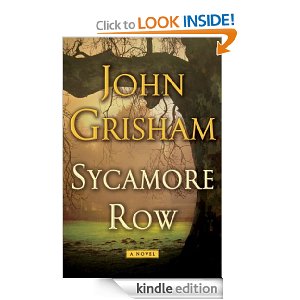I remember the ride very clearly. It was a good number years ago and we were on the way to Tupelo for me to do a continuing ed event at First Church Tupelo. My friend Bud Gordon pointed to a big spread on the right side of the highway and said, “That’s John Grisham place. That is, it was until he moved to Virginia.” How does one go from being a small state small time lawyer to being a big time novelist? The most natural straight line from A to B, is to write convincingly about what you know. And John Grisham certainly knows about the law, especially about Mississippi law. His first novel was ‘A Time to Kill’. Perhaps you have not journeyed that far back in Grisham ouevre, but you may want to do so now, as in a certain sense ‘Sycamore Row’ is a kind of sequel to that first novel from 1988 or so. Here is a little reminder of the plot of that one…
“This addictive tale of a young lawyer defending a black Vietnam war hero who kills the white druggies who raped his child in tiny Clanton, Mississippi, is “John Grisham’s first novel, and his favorite of his first six. He polished it for three years and every detail shines like pebbles at the bottom of a swift, sunlit stream. Grisham is a born legal storyteller and his dialogue is pitch perfect.”
“The plot turns with jeweled precision. Carl Lee Hailey gets an M-16 from the Chicago hoodlum he’d saved at Da Nang, wastes the rapists on the courthouse steps, then turns to attorney Jake Brigance, who needs a conspicuous win to boost his career. Folks want to give Carl Lee a second medal, but how can they ignore premeditated execution?”
This is the case which made Jack Brigance’s reputation, and in Sycamore Row he takes on another racially divisive, racially charged case. A woman named Lettie Lang is left the entire fortune of one Seth Hubbard, he a lumber magnate, she his house cleaner. He’s white, she’s black, and in the process he cuts out his whole family from the previous will. One more thing. Hubbard writes out this final will by hand (a so called valid holographic will) as he is in the last stages of dying of lung cancer…. and then he hangs himself. But was he of sound mind when he wrote the will? Did Lettie influence to do it? Inquiring minds want to know.
Generally speaking, when John Grisham has written about his native Mississippi the novels have been excellent. When he has written about New York or even Italy, not as snappy or as compelling. Sycamore Row is his best one in a good while, maybe a decade (and there has been at least one every year—- but I’m not complaining about his being prolific. That would be like the pot calling the kettle black).
What Grisham is especially good at is writing about issues of justice and racism, whether non-fiction (see the compelling An Innocent Man) or fiction. These are subjects he knows a lot about, and is passionate about. And as a son of the South, so am I. In fact the last time I cried like a baby at a movie was at Lincoln. Had that man lived the history of the South from 1865 until now might have been much different. Much different indeed. He was one Kentucky man I could identify with. He despised racism and sought to do something about it.
Some of the best features of this novel are: 1) the Christian message of forgiveness comes through loud and clear, especially in the middle of the novel; 2)Jack Brigance and his family are believable and likeable. Indeed most of the central characters are Christians of one description or another, both the black and the white ones; 3) Grisham deals well with the blind spots that even many white Christians have when it comes to racism, and its ongoing effects on our country; 4) there are the usual twists and turns, and some surprises in this novel, with a nice crescendo to the end. The ending is not a huge surprise, more of a culmination. But I shan’t say more.
At 466 pages it is one of the longer Grisham novels but its still a good page turner. And for $6.00 and change on Kindle, its a steal of a deal considering the cost of some books these days. In short, it would be a good Christmas present for someone.














